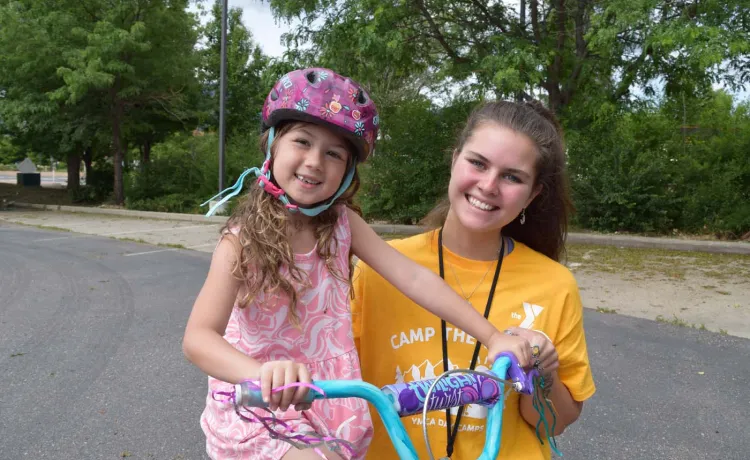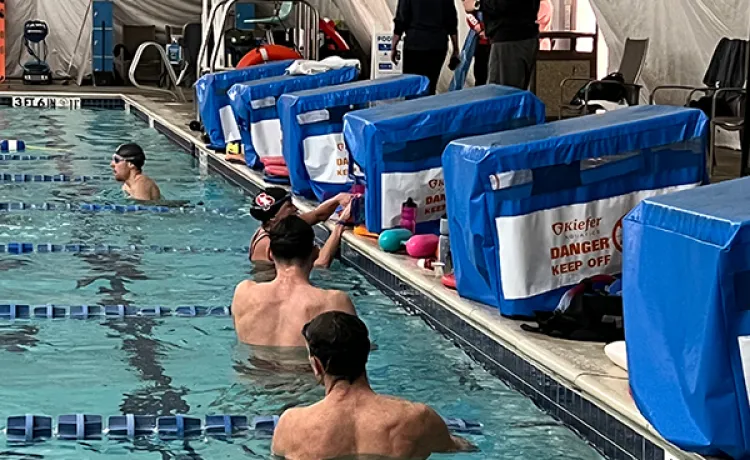
At Camp, Disconnect and Reconnect
We all know that technology is as addictive, as craveable and as ubiquitous as sugar. It’s everywhere, and it’s nearly impossible to quit.
Apr 3, 2025

4 Signs Your Child is Ready for Overnight Camp
Remember back in the day when you were gathered around a camp fire roasting marshmallows, singing camp songs and laughing with your friends during the summer
Mar 13, 2025

Walk It Off: How To Make Walks More Challenging
It can be tough to stay motivated and keep moving when fitness options are, well, um … when there are so few options. However, don’t underestimate the power of walking. Yes, walking.
Feb 12, 2025

5 Steps to Setting “Smart” Goals
We’ve all experienced the disappointment that comes with not achieving a goal. More often than not though, the reason we are unable to achieve our goals isn’t because we aren’t capable.
Feb 12, 2025

4 Reasons Why Swim Lessons Are a Year-Round Commitment
In the summer, swimming is a staple activity for all ages. Because of that, it’s an especially common time for families to enroll their kids in swim lessons.
Jan 9, 2025

Staff Leadership Academy: You Are #3
Remember that you are outside, playing with kids, running around, and coming home every night knowing that you made a difference. In fact, for some, you may be the only person making a difference in t
Jul 19, 2024

Is High Intensity Interval Exercise Right For Endurance Athletes?
High intensity interval training (or HIIT) has gained a lot of popularity over the last few years. HIIT in its simplest form is an exercise or workout done at a high intensity (you are so out of breat
Jul 15, 2024

6 Surprising Ways To Lower Stress
First, a big shout out to everyone who has stayed on top of their yoga and meditation practice during these past several months.
Jun 6, 2024

Four Ways Yoga Can Boost Your Mental Health
Did you know that 50% of mental health issues appear by age 14, and 75% by age 24? Feeling overwhelmed or stressed is common at any age — you might feel bogged down and unmotivated, especially during
Apr 29, 2024

A Mom's Guide to Infant Swim Lessons
I was not the type to sign up for something that included song singing. Not that I have anything against songs or singing. But being a new mom, the increasing requests for nursery rhyme performances h
Apr 12, 2024

Summer Jobs: A Silver Bullet for Teen Stress
I know that many of our young people struggle with school, social media, friends, life balance and so much more. For some reason, life seems to be much “higher stakes” for them.
Feb 28, 2023

Get to Know Your Y Masters Swim Coaches
If you’ve always dreamt about rubbing shoulders with Olympians in the pool or on the pool deck, we’ve got great news for you.
Feb 1, 2023

CEO: Apologies to Leonard
I need to apologize to my friend Leonard. I wish he lived next door to me because he is such a nice and caring guy, and since he is such a nice person, I want to apologize.
Aug 5, 2022

Bringing Summer Camp Home
Ahhhh, summertime. Flip flops, barbecues and the perpetual question of how to keep the kids busy with enriching activities. For many families, overnight or day summer camps are the perfect ways to che
Jan 9, 2025

Small Group Training: The Perfect Fit For Your Fitness Goals
Training with a small group has never-ending benefits. You'll enjoy more individualized attention and instruction as you work toward your ever-progressing wellness goals, with the motivation, safety a
May 16, 2025

How to Prep for Your First 14er
Maybe you've lived here your whole life and never ventured above 14,000 feet. Maybe it’s because you “never have time” to train, you’re too scared or you don't think you can make the trek.
May 26, 2025

CEO: There Is A Silver Bullet To How You Feel
In 1835, Alexis De Tocqueville wrote one of his most famous works entitled Democracy in America. The world was fascinated by the American Experiment in Democracy, so this work by De Tocqueville was ex
Jan 2, 2020

4 Ways A Personal Trainer Will Rock Your Workout
You see yourself running through the finish line of your first marathon or spending an entire weekend effortlessly skiing one run after another. You see yourself in new clothes or old clothes that had
Nov 16, 2018

CEO: Here's How College Grads Can Stand Out
I have three kids. One will graduate in May from Leeds School Of Business at CU, one will be a junior at DU and one is a high school sophomore. Two out of three are still incubating, but the college g
May 4, 2018

Poverty & Joy: A YMCA Service Trip to Peru
Our bus pushed through the intense traffic of Lima, weaving through cars like a mouse in a maze. The girls chatted excitedly and looked out the window at the congestion of cars as I watched the scener
Feb 7, 2025

Three Supplements You Actually Need
We all go to Whole Foods or Rite Aid, where there are bottles upon bottles of supplements that tell us they will make us younger, feel great and stay healthy. But how do you know what you need? Everyt
May 22, 2025

CEO: Let's Focus on Asset Development For Kids
The YMCA has an entire department at our national offices in Chicago responsible for improving the quality of our programs. That is why you see us change program models and design from time to time.
Aug 1, 2017

6 Tips for Safer Swimmers
Drowning is the second leading cause of death for children ages 5 to 14, with children from communities of color at greatest risk. With summer around the corner, it’s time for parents to remember the
May 1, 2017

Treading Water & Blowing Bubbles: Swimming Basics
That means swimming is a big part of our lives. It can be a hobby, an exercise, summertime favorite and a competitive endeavor. It can be something you enjoy or something you loathe. Either way, both
Apr 17, 2017

10 Fitness Hacks From Y Trainers
The fitness world can be an intimidating place, and finding a routine that works best for you can be a challenge. Here are a few tips and tricks from Y trainers to help you navigate through your fitne
Oct 25, 2016

American Heart Month Tips
February is American Heart Month, and as a leading nonprofit dedicated to improving the nation’s health and well-being, the YMCA of Boulder Valley offers the following tips to help families in our com
Feb 6, 2025
